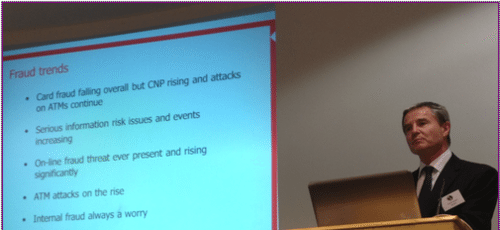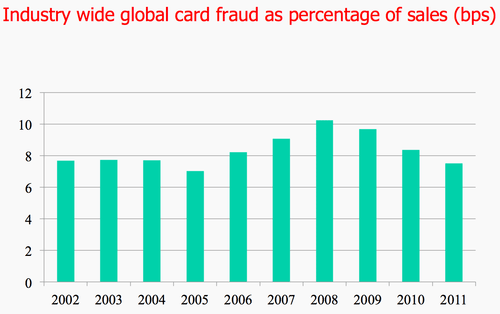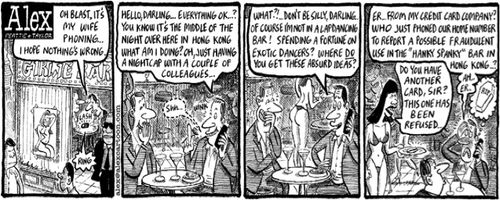
Derek Wylde, Group Head of Fraud at HSBC,
presented at the Financial Services Club last week.

He talked about many aspects of fraud and risk,
and presented quite a few numbers
related to the issue.
One of the charts raised questions in my
mind. It related to the total cost of payment card fraud. According to Derek, payment card fraud costs
an average of six to eight basis points on sales. For those who don’t use the terminology of basis points, a basis point
is 1/100th of a point, or 0.01 if you prefer. So fraud costs between 0.06% to 0.08% of the
total sales in payment cards.

Doesn’t sound like much does it.
Just eight basis points.
To put that in context however, a basis point of
card sales is worth billions, so eight basis points is a pretty large amount.
You can now see why fraud is an issue, and Derek went on to discuss the main trends in the industry, which include:
- card fraud falling generally,
although cardholder not present (CNP) attacks are rising; - ATM attacks are on the rise;
- serious information risk
issues and events are increasing; - online fraud threats are ever
present and are rising significantly; and - internal fraud is always a
worry.
Derek expanded on these points in depth, marking
the success of Chip & PIN as a key component of the success in minimising
fraud. He confidently expects the US to
follow the example of the rest of the world therefore in eventually adopting
Chip & PIN (although my sources say different).
With regard to ATM attacks, I was quite surprised
that these are on the rise, with an increase in ATM fraud in Europe of 63% over
the last year. My surprise is due to the
fact that much of the card fraud related to ATM attacks I had heard about years
ago, with crooks sticking webcams and wireless emitting devices into the
frontage of ATMs to get card data and PIN shots of customers using these
machines.
Apparently, such issues are still rife with card
skimming, reversal fraud card and cash trapping increasing and, more recently,
incidents of malware injection into ATMs to capture magnetic stripe data.
Derek went on to cover the whole gamut of mobile
and internet fraud issues, with phishers and the rest still creating a sea of
issues for the bank.
His summation is that the industry needs far more
support from the technology community to minimise fraud in the future, and
demanded real-time monitoring and analysis to enable the bank to capture the
crooks. Real-time is key as you only get
one chance to catch the criminals, never a second chance.
A sobering message and one that I also take to
heart.
At the end, Derek put up a cartoon that I found particularly
amusing for two reasons. One is that
it’s very funny and the second is that it’s an Alex cartoon, and reminded me
that we recently had Alex’s creators Charles Peattie and Russell Taylor
speaking at the Financial Services Club.
Therefore, for all of you who enjoy a good laugh, enjoy (doubleclick image to enlarge) …

Chris M Skinner
Chris Skinner is best known as an independent commentator on the financial markets through his blog, TheFinanser.com, as author of the bestselling book Digital Bank, and Chair of the European networking forum the Financial Services Club. He has been voted one of the most influential people in banking by The Financial Brand (as well as one of the best blogs), a FinTech Titan (Next Bank), one of the Fintech Leaders you need to follow (City AM, Deluxe and Jax Finance), as well as one of the Top 40 most influential people in financial technology by the Wall Street Journal's Financial News. To learn more click here...

